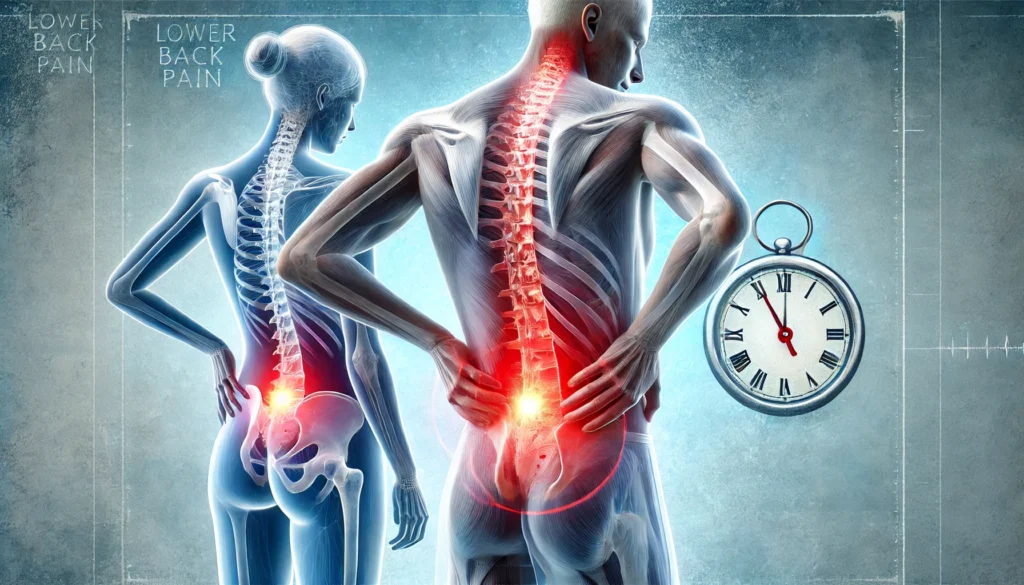Experiencing lower back pain in the morning that tends to go away after a while is a common issue for many individuals. While it can be discomforting, it often doesn’t signal a serious medical condition. In this article, we’ll explore the potential causes of morning lower back pain, why it may go away, and ways to manage and prevent it.
What Is Lower Back Pain in the Morning?
Lower back pain in the morning is typically characterized by discomfort or stiffness in the lower back when you wake up. It might be mild or severe and may decrease or disappear after moving around, stretching, or getting out of bed. For some people, the pain comes and goes, while for others, it can become a recurring issue.
Read Also: Vertebrogenic Low Back Pain: Causes, Symptoms, and Treatment – Spinal-Origin Low Back Pain!
Common Causes of Morning Lower Back Pain
Several factors can contribute to lower back pain in the morning. Some of the most common causes include:
1. Poor Sleep Posture
- Sleeping in an uncomfortable position can strain your lower back muscles and spine, leading to stiffness and pain when you wake up. If your mattress or pillow doesn’t provide proper support, it can worsen the issue.
2. Inadequate Mattress or Pillow Support
- A mattress that’s too firm or too soft, or a pillow that doesn’t align your neck and spine properly, can contribute to misalignment, causing pain in the lower back.
3. Lack of Movement During Sleep
- When you sleep in a position for an extended period without much movement, it can cause the muscles and joints in your lower back to become stiff. This can result in pain when you wake up, which often goes away after stretching or moving.
4. Muscle Tension or Strain
- Stress or physical strain on the muscles during the day can lead to muscle tension, which might become more noticeable in the morning. If your muscles haven’t fully relaxed overnight, this tension can lead to discomfort when you first get up.
5. Arthritis
- Conditions like osteoarthritis or rheumatoid arthritis can cause inflammation in the spine and joints, leading to morning stiffness and lower back pain that improves with movement as the day progresses.
6. Sciatica
- Sciatica, caused by pressure on the sciatic nerve, can cause lower back pain that is often more intense in the morning after sleeping in one position for too long. The pain tends to subside after moving or stretching.
Why Does the Pain Go Away After a While?

In most cases, the lower back pain you feel in the morning tends to subside as you begin to move around. This is because:
- Movement Relieves Stiffness: When you get out of bed and move, blood flow to the muscles and joints increases, which helps to relieve stiffness and discomfort.
- Stretching Helps: Gentle stretching can help loosen tight muscles in the lower back, reducing pain and stiffness.
- Endorphin Release: Physical movement can trigger the release of endorphins, which are the body’s natural pain relievers, helping to ease the discomfort.
How to Relieve and Prevent Morning Lower Back Pain
If you’re dealing with lower back pain in the morning that goes away after some time, here are a few tips to help alleviate the pain and prevent it from recurring:
1. Improve Your Sleep Posture
- Sleep on Your Side: Sleeping on your side with a pillow between your knees can help keep your spine aligned.
- Sleep on Your Back: If you sleep on your back, place a pillow under your knees to reduce pressure on the lower back.
- Avoid Stomach Sleeping: Sleeping on your stomach can strain your lower back and neck. Try to avoid this position if possible.
2. Invest in a Better Mattress and Pillow
- Choose a medium-firm mattress that provides adequate support for your spine. Your pillow should support your neck in a neutral position to avoid neck and back strain.
3. Stretch Before Bed
- Stretching before bed can help relax the muscles in your lower back and reduce tension that might lead to pain in the morning. Simple stretches like the cat-cow stretch or knee-to-chest stretches can help.
4. Strengthen Your Core Muscles
- Strengthening the muscles that support your spine, such as your core and lower back muscles, can help prevent back pain. Regular core exercises like planks, bridges, and leg raises can provide relief over time.
5. Stay Active
- Regular physical activity, including walking, swimming, or yoga, can improve flexibility and strength, reducing the risk of developing lower back pain in the morning.
6. Practice Stress-Relief Techniques
- Since stress can contribute to muscle tension, incorporating relaxation techniques such as deep breathing, meditation, or progressive muscle relaxation before bed can help reduce morning back pain.
When to See a Doctor
While morning lower back pain is often benign and improves with movement, there are instances where you should consult a doctor:
- If the pain is persistent, severe, or doesn’t improve with movement.
- If you experience additional symptoms like numbness, tingling, or weakness in your legs.
- If the pain is accompanied by other health concerns, such as unexplained weight loss, fever, or difficulty controlling bladder or bowel movements.
A healthcare professional can help identify the underlying cause of the pain and recommend appropriate treatments or lifestyle changes.
FAQs:
1 What causes lower back pain in the morning?
Poor sleep posture, an uncomfortable mattress, muscle tension, or conditions like arthritis can cause morning back pain.
2 Why does the pain go away after a while?
The pain usually goes away as you move around, which increases blood flow, reduces stiffness, and triggers endorphin release.
3 How can I prevent morning lower back pain?
Improving sleep posture, investing in a supportive mattress, stretching before bed, and strengthening core muscles can help prevent it.
4 Should I see a doctor if the pain persists?
Yes, if the pain is severe, persistent, or accompanied by numbness or other symptoms, it’s best to consult a doctor.
5 Can exercise help with morning lower back pain?
Yes, regular exercise, especially stretching and core strengthening, can help reduce the occurrence of lower back pain.
Conclusion:
Lower back pain in the morning that goes away after a while is usually caused by factors like poor posture, an inadequate mattress, muscle tension, or conditions like arthritis. With simple lifestyle adjustments such as improving sleep posture, investing in a good mattress, stretching, and staying active, you can relieve and prevent this type of back pain. If your pain persists or worsens, seeking medical advice is always a good idea to rule out any serious conditions.
Read More Relevant Article:
- Read Also: Gastritis Symptoms and Back Pain – Signs of Gastritis and Their Connection to Back Pain!
- Read Also: Middle Back Pain Around the Rib Cage – Pain in the Middle Back Near the Rib Cage!
- Read Also: Why Does My Upper Back Hurt When I Breathe – What’s Behind the Pain in My Upper Back When Breathing!











